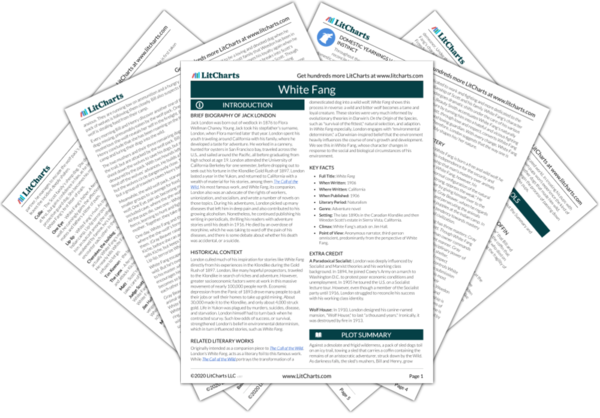Summary
Analysis
With Lip-lip gone, Mit-sah makes White Fang the leader of the sled pack. The other dogs become jealous of White Fang and grow to hate him, attacking him whenever they make camp. White Fang attacks and hates them in turn, harboring "bitterness" and "malice" in his heart towards all dogs.
White Fang changes because his circumstances change. Because his master places him in a position of leadership, he garners the hatred of his subordinates, rather than their respect. Because they hate him him, he, in turn, develops a hateful, oppressive personality.
Themes
Literary Devices
When White Fang is nearly five, Gray Beaver takes him to Fort Yukon. Along the way, he attacks every unsuspecting dog he encounters, becoming a lean, keen, and mean fighting dog.
The harsh conditions on the trail develop and perfect White Fang's body, intelligence, and naturally ferocious nature, but also make him mean. His experiences have taught him that such meanness and cruelty are all that will keep him alive.
Themes
Literary Devices
At Fort Yukon, Gray Beaver catches wind of the gold rush and settles there to trade furs with the miners. White Fang sees white men for the first time and considers them to be "a race of superior gods," more powerful than his Indian masters.
White Fang's regard of white men as "superior" and powerful gods, underlines not only his awe of them, but also his impressionability. White Fang's sense, here, may also mirror London's own (racist) belief in the superiority of white men.
Themes
Yet White Fang lays waste on the white men's dogs, fighting and killing these weak and ill-adapted animals with ease. Molded into a "ferocious" and "unloving" beast, he has become the "enemy of his kind."
Unlike the dogs he kills, White Fang is fit to survive and thrive in the wild. His killings also demonstrate his hateful and vicious character. His wrathful nature has been conditioned by his merciless upbringing. He holds no love for dogs, which, because of his wildness, never held any love for him.
Themes
Get the entire White Fang LitChart as a printable PDF.













